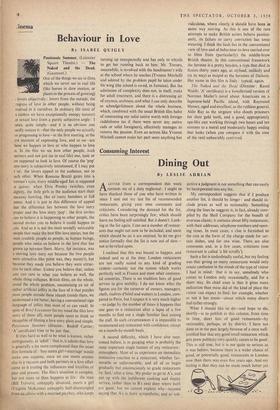:inema
Behaviour in Love
By ISABEL QUIGLY Passionate Summer. (Leicester Square Theatre.) — The Naked and the Dead. (Gaumont.) ONE of the things we see in films which we never see in real life (like horses in slow motion, or rogress of love in other people, without being evolved in it ourselves. In ordinary life most of s (unless we have exceptionally snoopy natures) ze sexual love from a purely subjective angle : I ;lean, quite simply—and it is so obvious one IardIy notices it—that the only people we actually ee progressing in love—at the first meeting, at the irst moment of expressing love, and so on—are hose we happen to love or who happen to loge is. In the film we see how other people, both partners and not just (as in real life) one, look or ire supposed to look in love. Of course the 'pop' ove story is subjectively intentioned, if I may put t so: the lovers appeal to the audience, not to !ach other. When Rossano Brazzi gazes into a voman's eyes, every middle-aged fan is supposed o quiver; when Elvis Presley twitches, even 'lightly, the little girls in the audience start their .mcanny howling, like so many banshees at full noon. And it is just in this difference of appeal that the difference lies between the love story proper and the love story 'pop': the first invites you to believe it is happening to other people, the second invites you to believe it could happen to you. And so it is not the most sexually noticeable 9eople that make the best film love stories, but the most credible people as people, as human beings,, people who make us believe in the love that has grown up between them. Marty, for instance, was . moving love story not because the two people were attractive (the point was, they weren't), but because they made you believe they were attrac- tive to each other. Unless you believe that, unless you can care in .what you believe as well, the whole thing collapses. British films, on the whole, avoid the whole problem, maintaining an air of rather artificial jollity in the face of it that puzzles most people outside these islands (inside them, we understand a bit better, having a conventional sign language of jollity that most of us can read). In spite of Brief Encounter (to my mind the film love story of them all), most people seem to think us incapable of filming a love story plain and simple. Passionate Summer (director : Rudolf Cartier; 'A' certificate) tries to be just that.
It tries hard as well to be what is known, rather ambiguously, as `adult' : that is, it admits that love is generally a lot more complicated than the usual film formula of : 'boy meets girl= marriage' would make one suppose, since no one meets anyone else in a vacuum and both partners in a love affair come to it trailing the influences and loyalties of past and present. The film's situation is complex, but not more so than happens in life : the man (Bill Travers), unhappily divorced, meets a girl (Virginia McKenna) unhappily half-disentangled from an offaire with a married playboy, who keeps turning up unexpectedly and has only to whistle to get her running back to him; Mr. Travers, meanwhile, is involved with the headmaster's wife at the school where he teaches (Yvonne Mitchell) and adored by the problem pupil he takes under his wing (the school is co-ed, in Jamaica). But the admission of complexity does, not, in itself, make for adult treatment, and there is a distressing air of coyness, archness, and what I can only describe as schoolgirlishness about the whole business, which, combined with the usual British film habit of contrasting our solid native worth with foreign caddishness (as if there were never any native cads or solid foreigners), effectively manages to remove the passion. Even an actress like Yvonne Mitchell cannot make her part seem anything but ridiculous, where clearly it should have been in some way moving. As this is one of the rare attempts to make British actors behave passion- ately, its failure to carry conviction has some meaning. I think the fault lies in the conventional view of love and of behaviour-in-love carried over to films from (particularly) the middle-brow British theatre. In this conventional framework the heroine is a pretty hoyden, a type that died in fiction.thirty years ago, as stylised, unlikely and (in its way) as insipid as the heroines of Dickens. Her name in this film is Judy : typical, again.
The Naked and the Dead (Director : Raoul Walsh; 'A' certificate) is a bowdlerised version of Norman Mailer's novel about Americans on a Japanese-held Pacific island, with Raymond Massey, aged and excellent, as the ruthless general, Aldo Ray as the sergeant who shoots prisoners for their gold teeth, and a good, appropriately ape-like cast working through two hours and ten minutes to a moral and moderately happy ending that looks (when you compare it with the tone of the rest) unbearably contrived.


















































 Previous page
Previous page